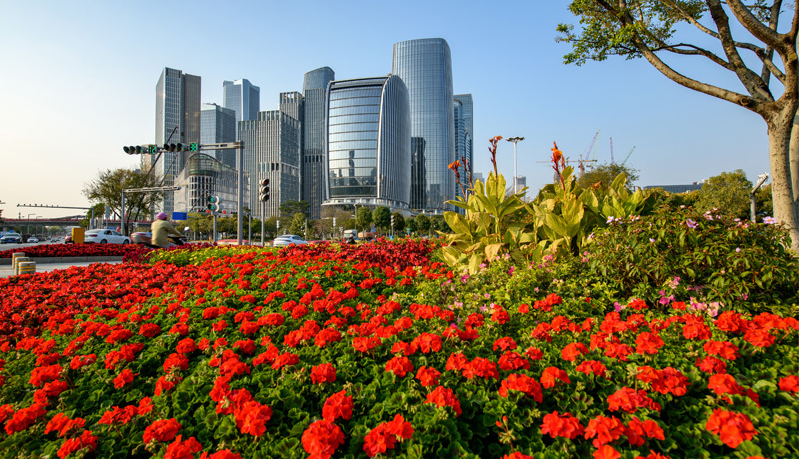
In the final act of the biblical drama two themes combine to form a vision of the future: the urban and the intercultural.
The future – God’s future – is a multicultural one. John has a four-fold way of describing the nations of the world: ‘peoples, tribes, languages, and nations’. It varies each time it is used but the phrase is always four-fold, and we find it seven times in Revelation: 5:9, 7:9; 10:11; 11:9; 13:7; 14:6; 17:15. Numbers are significant in Revelation: 7 signifies completeness and 4 is the number of the world (with its four corners: Revelation 7:1; 20:8).
The gospel creates a multicultural community. Its full expression will be seen in all its beautiful diversity in the new creation. This future vision motivates us to make the gospel of the kingdom seen, heard, and translated into the thought forms and life forms of all "peoples, tribes, languages, and nations".
God’s future is also an urban one. The final two chapters of Revelation describe the city of God, the New Jerusalem. First century Christians hearing John’s message would have had their own experience of urban life in the Roman empire. Sociologist Rodney Stark describes Antioch, a typical Roman city, as: "A city where the average family lived a squalid life in filthy and cramped quarters, where at least half of the children died at birth or during infancy, and where most of the children who lived lost at least one parent before reaching maturity. A city filled with hatred and fear rooted in intense ethnic antagonisms and exacerbated by a constant stream of strangers."
Stark goes on to point out that as Christianity began to grow in cities, "its superior capacity for meeting these chronic problems soon became evident and played a major role in its ultimate triumph."
Cities and God’s mission today
By 2050 some 70 per cent of the world’s population, about 6.3 billion people, will be living in cities. Today, 1 in 7 people on the planet currently lives in a slum, and 1 in every 4 will live in a slum by 2030, according to current estimates.
We need to do more in developing our theology and practice of urban mission. Revelation challenges us to embody and proclaim the gospel in all its fullness, and to anticipate in our missions work today, that vision of God’s urban future in the new creation. David Smith, in his book, "Liberating The Gospel", notes that "The hope inspired by John’s visions is not focused entirely on the future, but provides both a radically alternative model of human, urban community and society, and the inspiration and dynamic enabling resistance to evil and the creation of counter-cultural communities in the present."
It is often the intercultural character of these counter-cultural communities in today’s cities that marks them out as signposts of hope and healing. As theologian René Padilla said: "the church is called to be, both locally and globally, the community of reconciliation fully committed to unity and mutual acceptance in the midst of diversity, fragmentation, discrimination, exclusion, and social apartheid."
Imaginative witness today
Finally, the nature of the book of Revelation itself is instructive for how we think of our witness everywhere in today’s world, but particularly in urban contexts.
The circumstances into which the message of Revelation first came required fresh vision and a different kind of theological vocabulary. "The visions", David Smith continues, "demonstrate the crucial importance of the faculty of the imagination in the Christian response to the world."
Our fruitful anticipation in this present life of the counter-cultural vision that combines the urban and intercultural themes of Revelation will require our imagination.
For example, Alister McGrath describes how C.S. Lewis was able to engage secular culture through his novels, creating an imaginary world that set the scene for commending the faith. Lewis has been seen "as a catalyst, who opens up a deeper vision of the Christian faith, engaging the mind, the feelings, and the imagination…".
Few of us will have an impact like Lewis, yet isn’t this what mission requires in all the contexts in which we minister and for whom we pray? That through our kingdom witness we become catalysts, opening up a deeper vision, engaging the mind, the feelings, and the imagination, so that we translate Christ, in all his fullness, into the thought forms and life forms of the peoples, places, societies and cultures, in which we find ourselves.
Following the inspiration compiled by Warren Beattie and Anne Soh, and the example of artist Makoto Fujiura, I am convinced that one of the most effective spheres to employ the faculty of the imagination in the Christian response to the world is the arts. Wouldn’t it be great to see intercultural churches engaging their urban context by creating an environment where imaginations are opened up to consider the transforming power and beauty of the gospel and what it means to anticipate a new world coming?
Originally published in OMF (UK)'s Billions magazine. Republished with permission.
Dr. Peter Rowan has served with OMF International for over twenty-five years. He was most recently Co-National Director of OMF (UK) and previously served on the faculty of Malaysia Bible Seminary. He is the author of Proclaiming the Peacemaker: The Malaysian Church as an Agent for Reconciliation in a Multicultural Society (Regnum, 2012) and Seeking Reconciliation: The Peacemaking Witness of the Church in Malaysia (Regnum, 2019).





